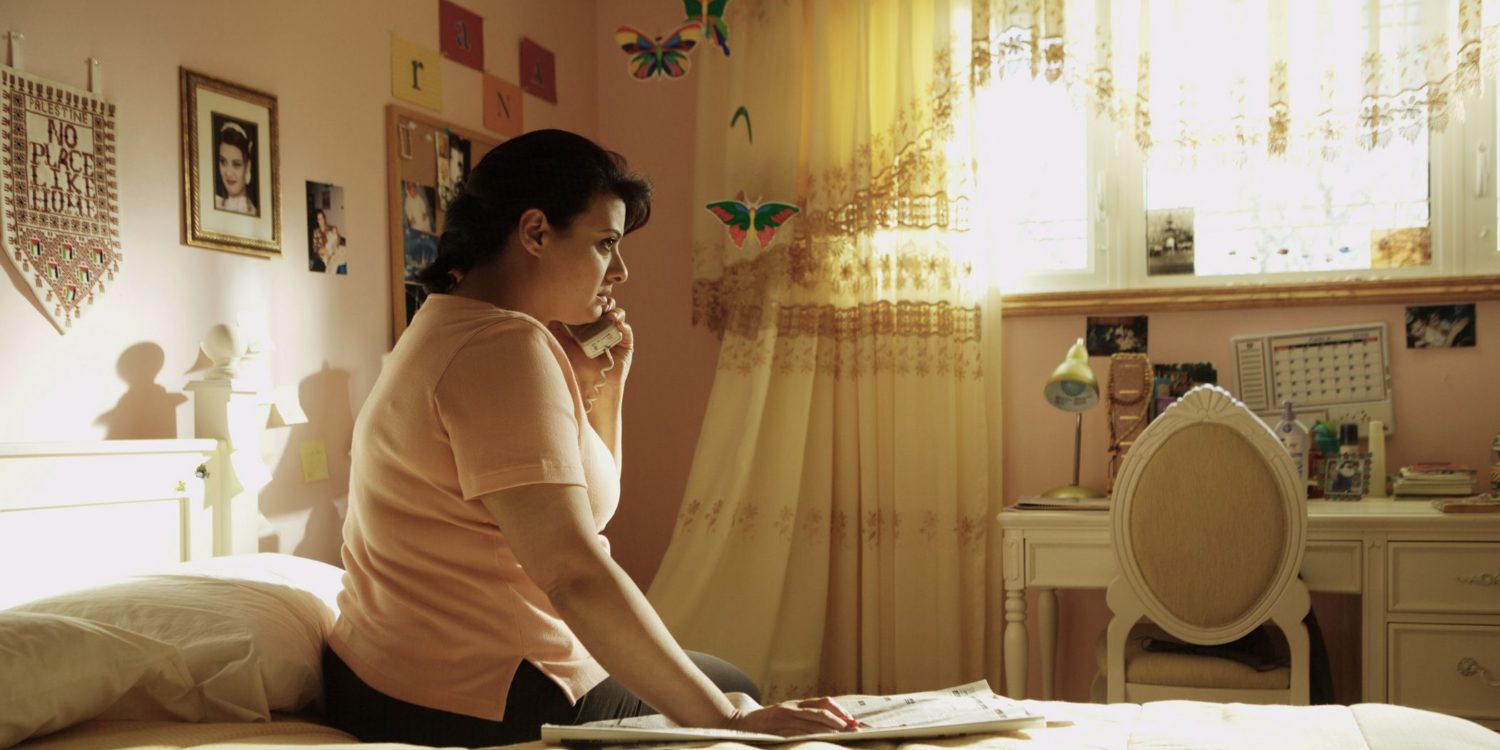We are surrounded today by uncertainty, loneliness, and fear. If, like me, you turn to cinema to sooth your soul, challenge your assumptions, and open your eyes, I hope you can find something in this collection that fits your current state of mind.
I’ve put together a list of notable contemporary Arabic films, available online, with a focus on lesser-known titles from diverse backgrounds in the hope of helping you find something new and filling in some gaps in your Arab cinema viewing. I’ve also listed Arab film institutions sharing their (rotating) collections online, and online festivals featuring Arab cinema.
Individual Films
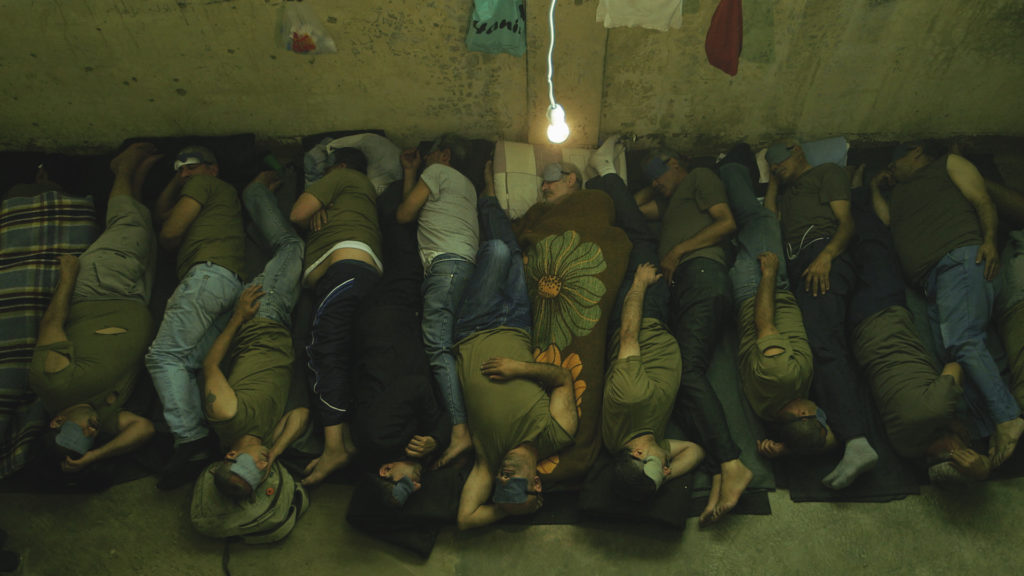
Tadmor / تدمر (Monika Borgmann and Lokman Slim, 2016, 1 hr 43 min, Lebanon)
The follow-up to their confessional, disturbing Massaker (2005), Borgmann and Slim here film former detainees of Syria’s notorious Tadmor detention centre as they re-enact their experiences in a replica of the prison. The testimonies to camera are horrifying and unflinching, but never exploitative, and the men defiantly maintain their humanity throughout. The film will invariably attract comparisons to Raed Andoni’s Ghost Hunting (though both were presumably in production at the same time), but unlike Andoni’s experiment, the role of the filmmakers in Tadmor is never clear, making for even more uncomfortable viewing.
Full film currently free on vimeo. Password: TadmorEnglish2016
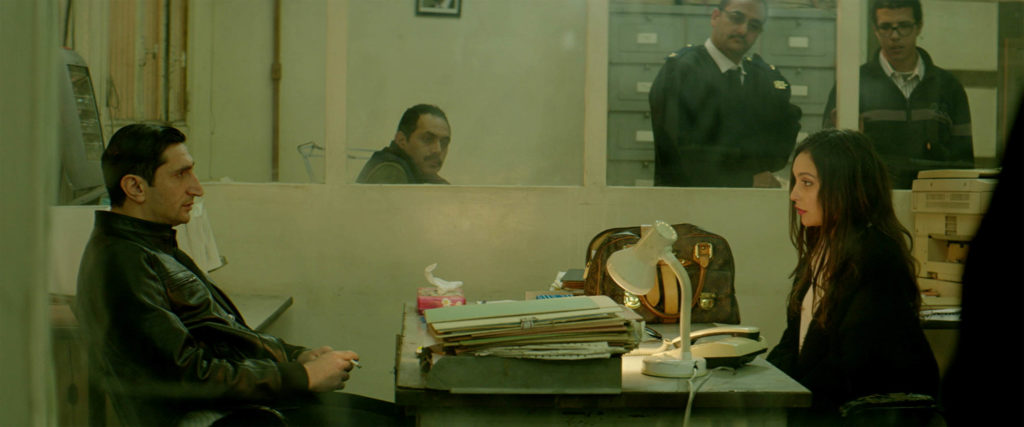
Fares Fares and Hania Amar appear in The Nile Hilton Incident by Tarik Saleh, an official selection of the World Cinema Dramatic Competition at the 2017 Sundance Film Festival. Courtesy of Sundance Institute.
The Nile Hilton Incident / حادث النيل هيلتون (Tarik Saleh, 2017, 1hr 51min, Sweden)
While Saleh is considered a Swedish director, his Egyptian roots drew him to Cairo for his first Arabic-language film: an anxiety-inducing film-noir set in the city’s corrupt and amoral underbelly. The film takes place in the days just before the country’s 2011 revolution, and an extraordinary performance from Fares Fares reflects the helplessness many of us feel in the face of overwhelming political power. An evocation of Roman Polanski’s Chinatown on the Nile, it meticulously recreates all the slime, heat, and arrogance of Cairo’s dark side.
Free from Channel 4 or BFI player in the UK.
Or many other international options here.
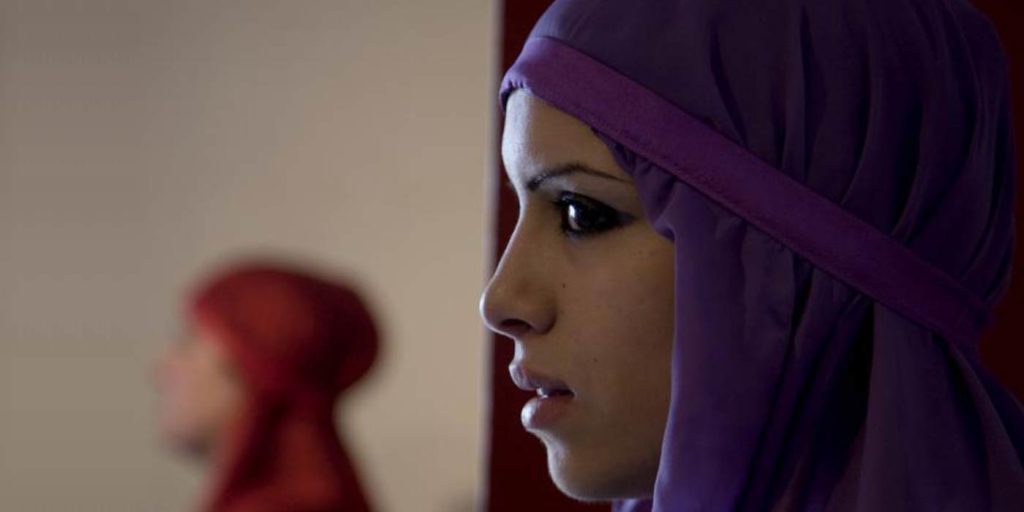
Scheherazade’s Diary / يوميات شهرزاد (Zeina Daccache, 2013, 1hr 18min, Lebanon)
Daccache’s camera – without judgement – enters one of the most inaccessible spaces imaginable: a women’s prison in Lebanon. Through the framework of a drama therapy project, the women prepare to stage the classic Arabic folktales of 1001 Nights. With a renewed sense of self-worth, the women share incredibly intimate stories of their traumatic past with stunning honesty to a camera that is both part of, and shaping, the narrative. The biggest revelation is how they maintain their dignity in a system, and country, that often does everything it can to break it down.
Available on Youtube, Google Play, iTunes.
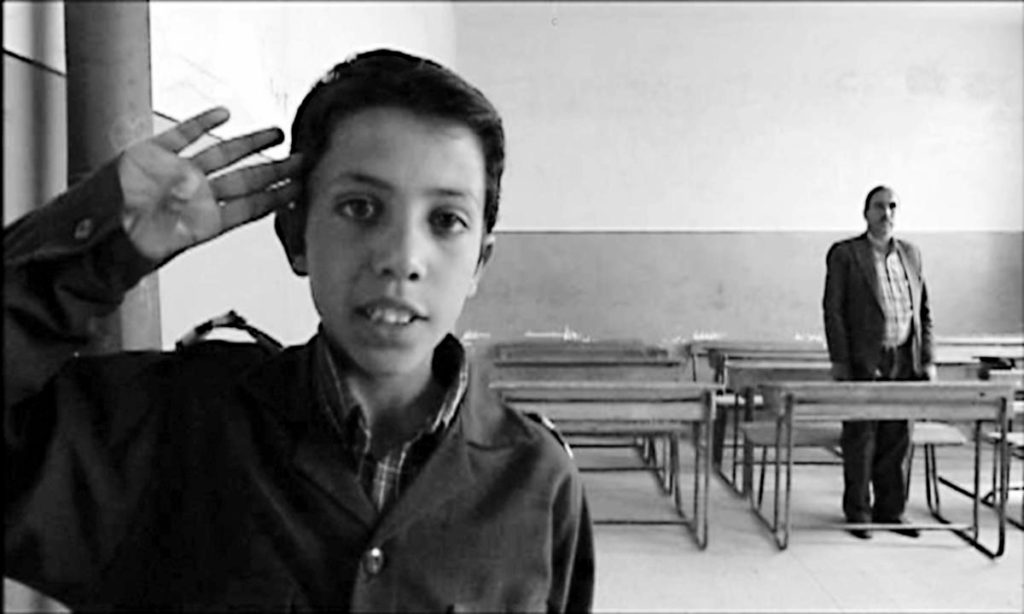
A Flood in Baath Country / طوفان في بلد البعث (Omar Amiralay, 2004, 46min, Syria)
An obscure, but ground-breaking, short documentary. And a rare example of self-critical filmmaking from a region where politics can change us daily. Decades earlier, Omar Amiralay bought into Syria’s Baathist propaganda and made his first film glorifying a dam on the Euphrates. When the dam collapsed, he made this film about the community at the accident’s epicentre. It very subtly, but pointedly, pulls apart the myths that dictatorships weave to keep their citizens in a stupor of obedience.
Watch for free on Youtube.
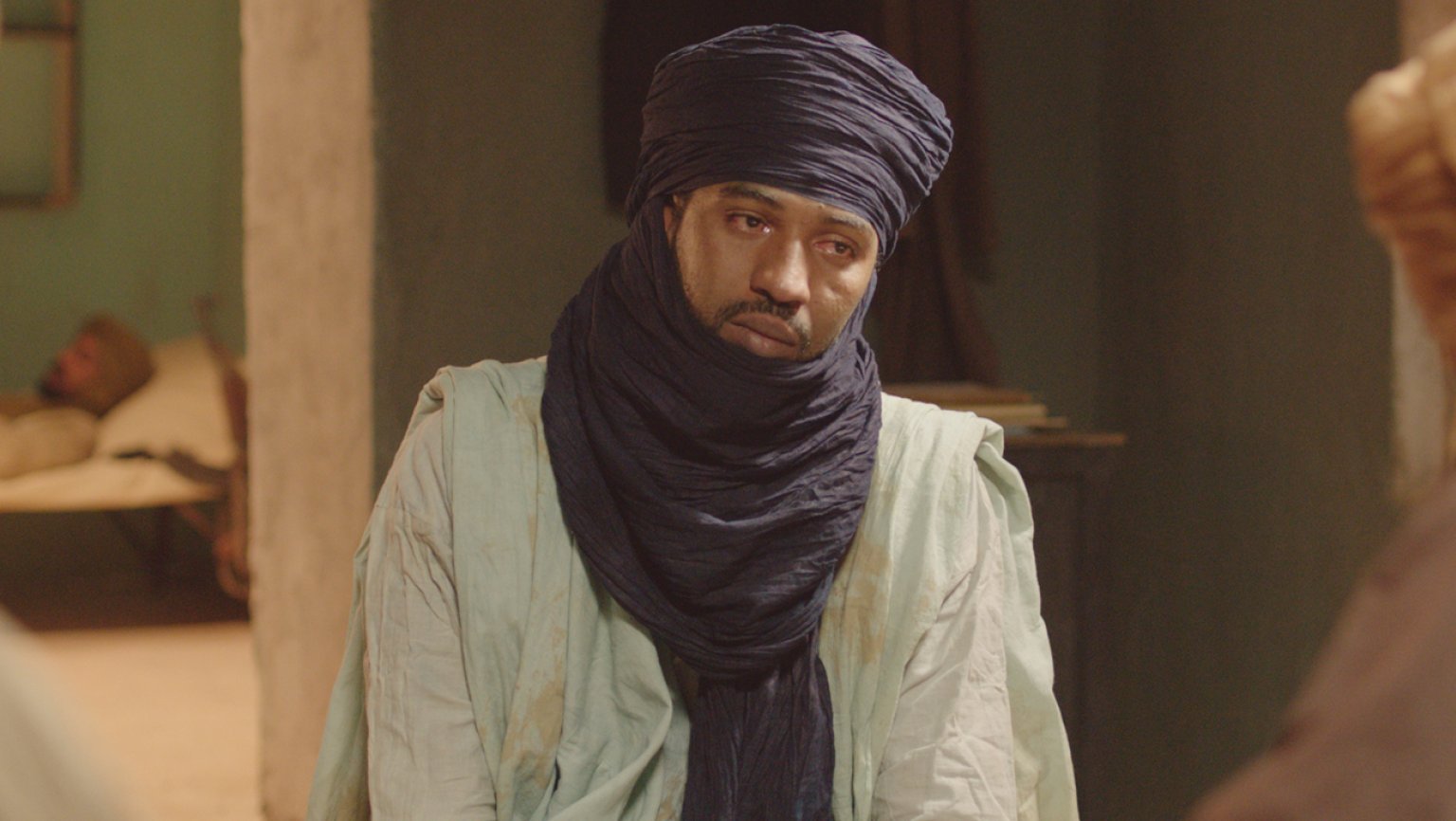
Timbuktu (Abderrahmane Sissako, 2014, 1hr 40 min, Mauritania)
Sissako crafts the most elegant, nuanced, and incisive examination of Islamic militancy in contemporary cinema. Expertly restrained, and suitably surreal, the film explores both the beauty and brutality of life for the residents of Timbuktu when it’s taken over by an ISIS-like group of extremists. Based on true events, this is the latest film from one of Africa’s foremost filmmakers and was in competition at Cannes and nominated for a Best Foreign Film Academy Award.
Free on BBC iPlayer until 4 May or these rental options.
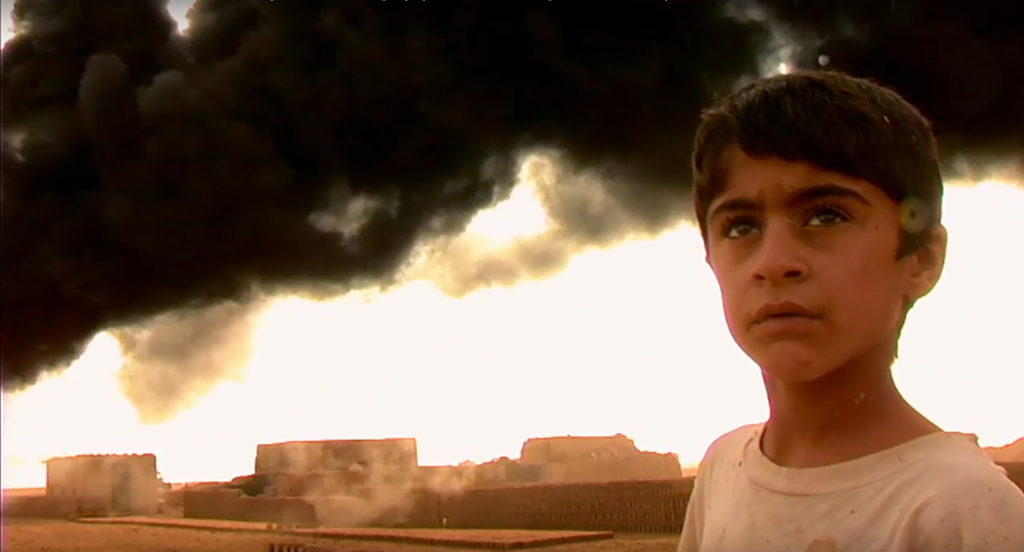
Gaza Strip, Iraq in Fragments, & Sari’s Mother (James Longley, 2002, 2006, 2006, 1hr 14 min, 1hr 34 min, 21min, USA)
Longley’s trilogy about children in conflict is as radical in its humanism as it is innovative in its form. Masterfully plotless, impressionistic fugues, his two Iraq films were nominated for Academy Awards, and Iraq in Fragments was a benchmark in creative conflict filmmaking that inspired a generation of documentary directors (myself included).
All free on Youtube: Gaza Strip | Sari’s Mother | Iraq In Fragments
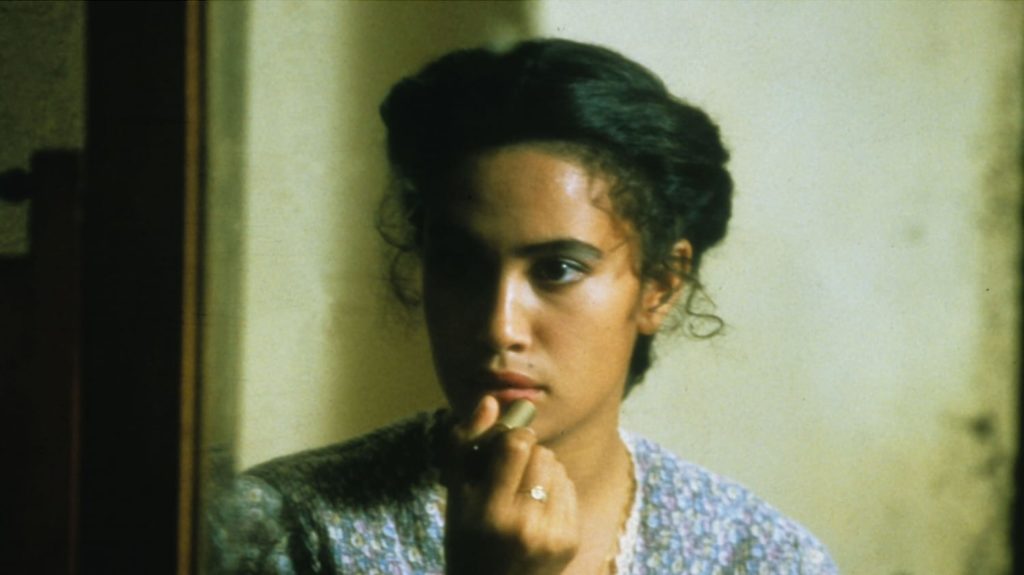
The Silences of the Palace / صمت القصور (Moufida Tlatli, 1995, 2h 9m, Tunisia)
The power of music in a time of political upheaval. With this film, Tlatli became the first Arab woman to direct a feature length film in the Arab World, and was one of the earliest films in Tunisia’s “New Wave”. It’s a bold and tender epic about the simultaneous struggles against patriarchy, colonialism, and class exploitation, and features early performances by two outstanding actors, Hind Sabry and Sami Bouajila who are now regulars in Tunisian cinema.
It’s sadly often forgotten now and only available in a low-quality Youtube link (you’ll need to click the CC link at the bottom to turn on English subtitles).
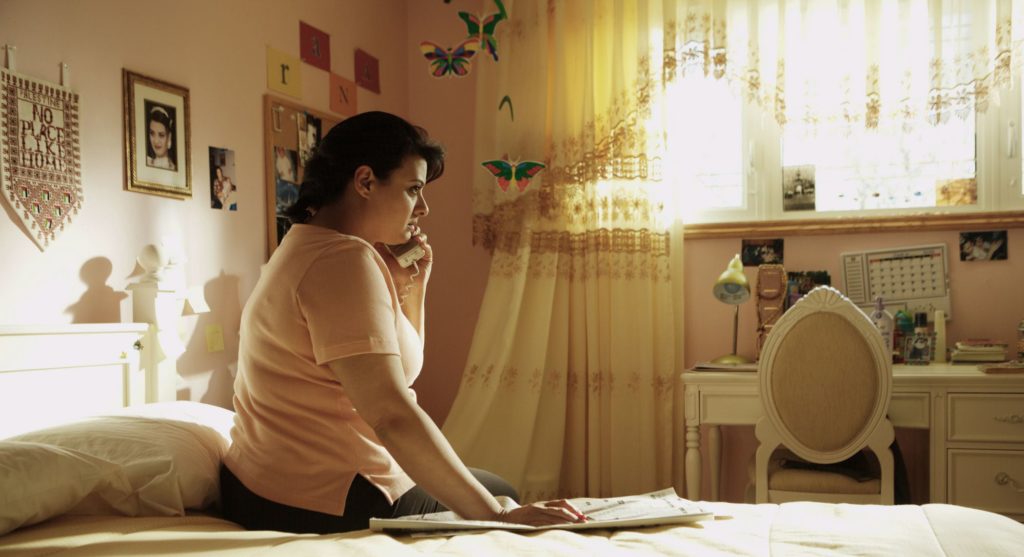
Amreeka (Cherien Dabis, 2009, 1hr 38, USA)
A delicate but deeply resonant story that heralded the Palestinian cinema of the first generation of directors who came of age post-Oslo, often in the diaspora. Nisreen Faour’s endearing naivete as Muna is simultaneously heart-breaking and hopeful, a balance that permeates the entire film. Every Arab living in the diaspora will recognise the family at the film’s centre, and will understand the sublime ambiguity of the story’s ending.
Dabis has very kindly made the film available for free on Vimeo.
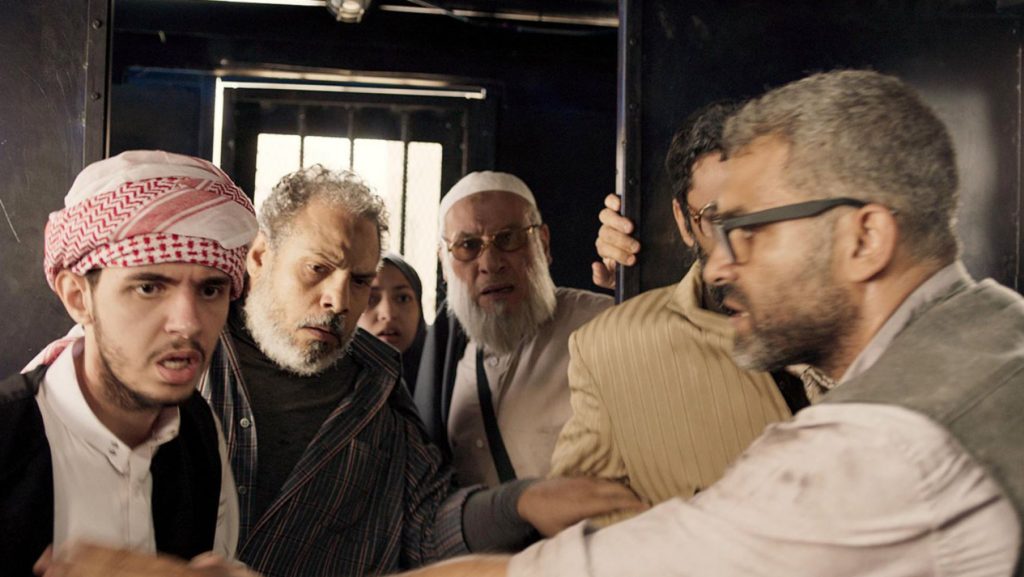
Clash / اشتباك (Mohamed Diab, 2016, 1hr 37min, Egypt)
Set shortly after the ousting of Egypt’s President Morsi in 2013, this film is most remarkable for its audacity. Filming entirely in the back of a police van, sometimes in secret, Diab somehow staged enormous riots on the real streets of Cairo, wrote police characters that are mostly irredeemably sadistic, and made a genuinely political film all in an official Egyptian production (it was even submitted as the country’s entry for Best Foreign Language Oscar). It would be unthinkable today. Though the script is sometimes too ideological, the film is worth watching for the boldness of its approach, and as a document of a very brief moment in modern Egyptian cinema when a project like this could be realised.
Available on a range of online rental platforms.
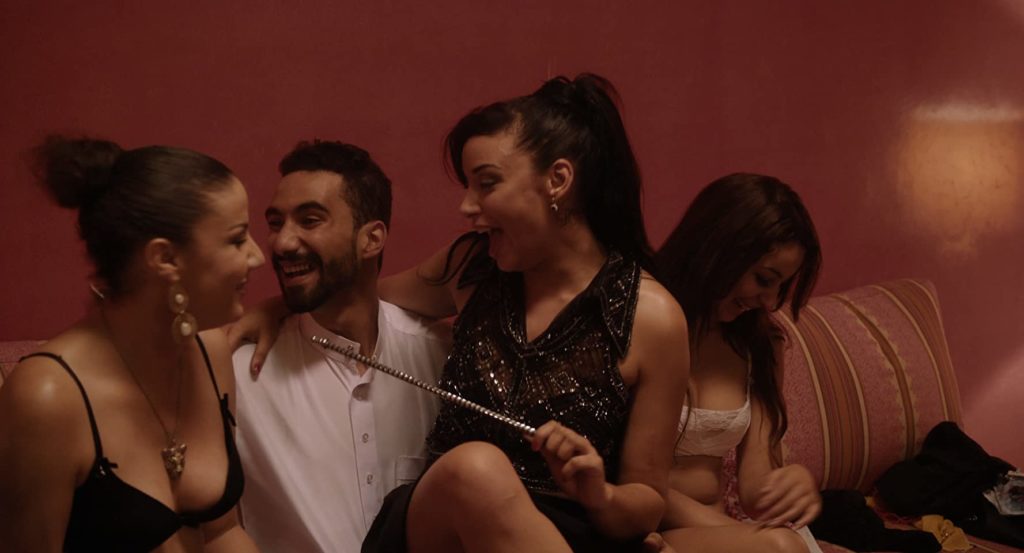
Much Loved / الزين اللي فيك (Nabil Ayouch, 2015, 1hr44, Morocco)
A film that stabs through the touristic fantasy of Marrakesh in its portrayal of the country’s prostitutes, it ambitiously addresses many of the country’s issues (sometimes too many) at the same time: sexual and class exploitation, rape, police corruption, sex tourism, paedophilia, suppressed homosexuality, and more. While its party scenes are sometimes too indulgent, Loubnar Abidar’s performance as Noha is so finely balanced she never loses her self-respect no matter how dark things get. Predictably, the film was banned in Morocco, Director Nabil Ayouch and star Loubnar Abidar were charged with “pornography, indecency and inciting minors to debauchery”, and Abadir had to flee to Paris after enduring death threats and a violent attack in Morocco.
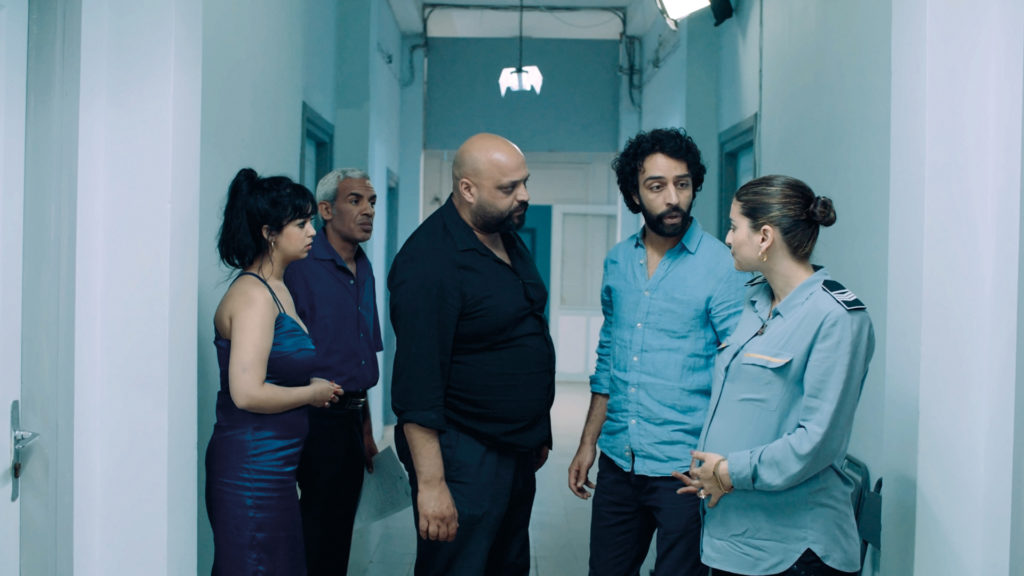
Beauty And The Dogs / على كف عفريت (Kaouther Ben Hania, 2017, 1hr 40min, Tunisia)
Ben Hania’s latest film follow’s Mariam’s harrowing journey, over the course of one night, to report her rape by a group of policemen. The film’s structure – 9 chapters, each captured in a single uncut take – is ambitious but sometimes more of an obstacle than an asset, and the script veers into rhetoric a little too often. There’s no denying, however, that this is a brave, artistically imaginative, and stirring indictment of the failure of the country’s post-revolutionary institutions. Mariam Al Ferjani is incredible as the lead, riding a rollercoaster from vulnerable and helpless to headstrong and determined, often in the course of a single scene.
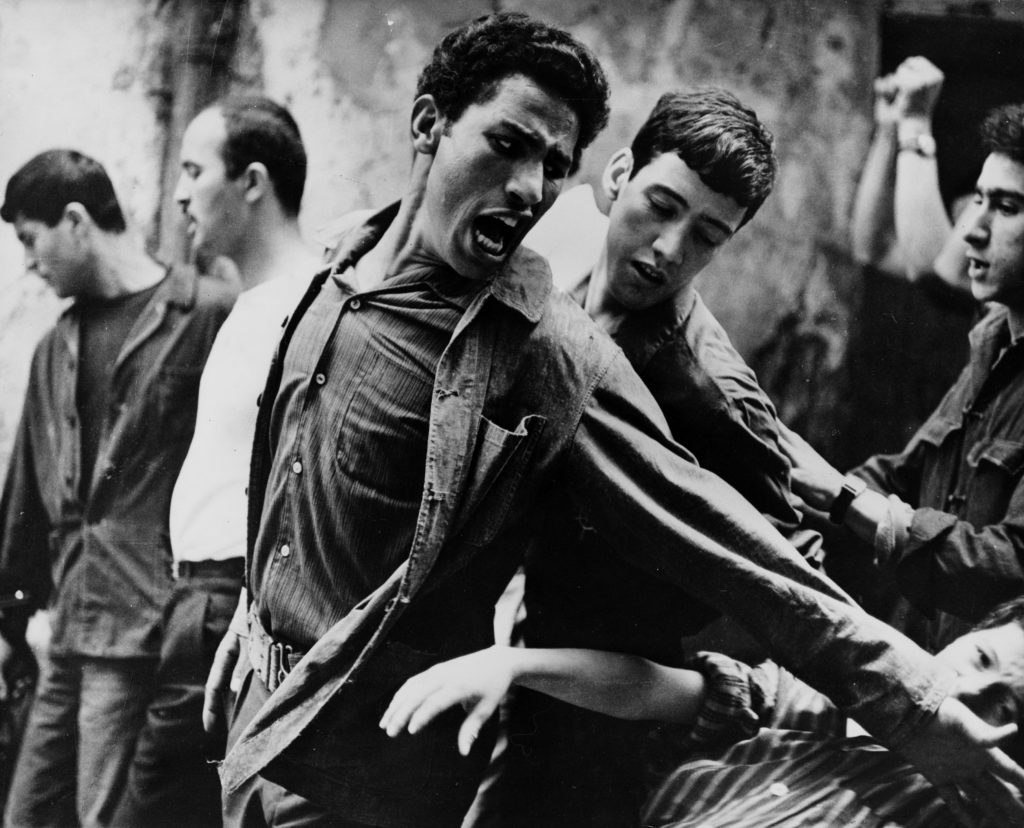
Brahim Haggiag (center, with arm outstretched) as revolutionary leader Ali La Pointe in a scene from Gillo Pontecorvo’s THE BATTLE OF ALGIERS (1965). Photo courtesy of British Film Institute/Rialto Pictures.
The Battle of Algiers (Gillo Pontecorvo, 1966, 2hrs, Italy)
Unusually, one of the most famous Arabic films wasn’t made by an Arab filmmaker. Pontecorvo’s magnum opus is often named one of the best films ever made, and it remains as impactful as it must have been when it was first released only 4 years after the end of the Algerian war of Independence. Shot on location, with mostly non-actors who had been involved in the real battle, the film is a searing example of the power of neo-realism to both provide an alternative, oral history of events, and redefine our perception of cinema itself. A good companion to Clash in its daring re-enactment of events in their original location, not long after they happened, the film was considered so realistic a portrayal of guerrilla warfare that the Pentagon screened it for commanders and troops before their invasion of Iraq in 2003.
Watch on BFI Player and other streaming and rental options.
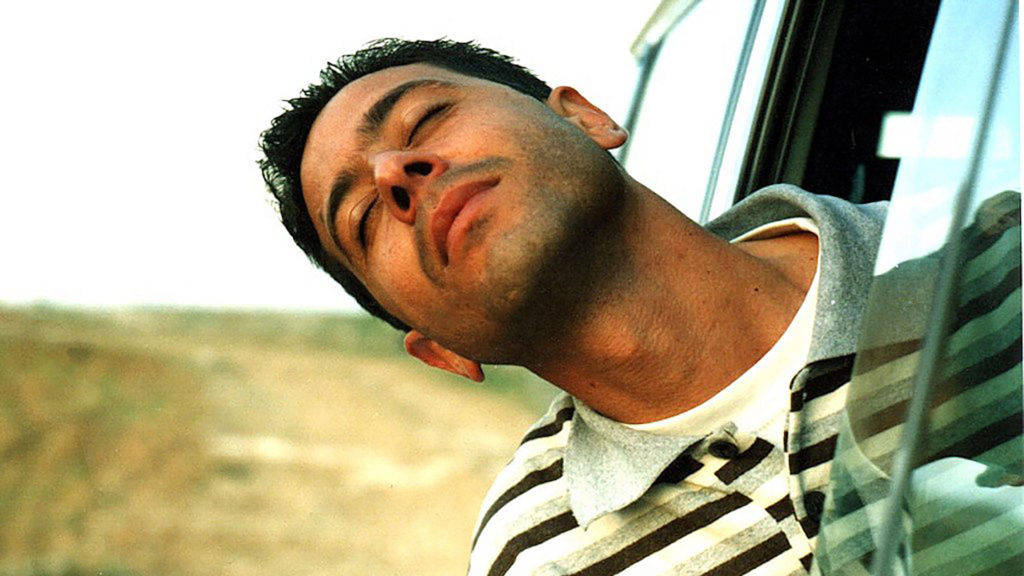
Like Twenty Impossibles / كأننا عشرون مستحيل (Annemarie Jacir, 2003, 17min, Palestine)
Today, Jacir is one of Palestine’s best known filmmakers, and one of the pioneers of the Palestinian “New Wave”. She’s made three feature films since this early short – the first Arab short officially selected to the Cannes film festival – but this piece remains her most creative and unconventional work so far. Free from the rhetoric that sometimes dilutes her feature scripts, its fractured narrative and disjointed sound and picture perfectly parallel the psychology and landscape of occupation.
Available on vimeo to rent or buy, or join the watch party to see it for free on 16 April.
Honourable Mentions
Finally, I wanted to include a list of Arabic films that I would love to recommend but which sadly aren’t available online or aren’t available with English subtitles. This highlights a general flaw in distribution for Arabic films, many of which struggle outside the arthouse cinema circuit.
Zaman, The Man From The Reeds (Amer Alwan, 2003, 1hr 17min, Iraq)
This is the last Iraqi film made before the US invasion of 2003, an event that looms over this meditative, solemn, but inescapably human story. Alwan, previously a documentary director, brings a naturalism and restraint to the kind of neo-realism that has produced some of the Arab World’s best films since the early 2000s. The plot is simple: an Iraqi man from the marshes must travel to Baghdad to pick up his wife’s medication. But the emotional journey is the real story.
It is available on Youtube but only with French subtitles.
Coming Forth By Day / الخروج للنهار (Hala Lotfy, 2012, 1hr 36min, Egypt)
Lotfy’s phenomenal feature debut, this radically naturalistic film is the slow, often painful story of a working-class mother and daughter caring for their disabled father. It’s a difficult watch, but it’s worth it for Donia Maher and Salma Al-Naggar’s minimalistic, but exceptionally layered, performances.
Here’s a clip on Youtube.
I Am The One Who Brings Flowers To Her Grave / أنا التي تحمل الزهور الى قبرها
(Hala Abdallah & Ammar Al Beik, 2006, 1hr 50min, Syria)
A pioneer of contemporary Syrian cinema (and friends with Omar Amiralay), Abdallah’s documentary about personal and political history, trauma, and exile is a non-linear, non-narrative, impressionistic poem. To call it a “film” is too reductive. It’s a work of art, distinctively political and deeply introspective.
Abou Leila (Amin Sidi-Boumedine, 2019, 2hr 15min, Algeria)
One of the most electrifying, bewildering, and memorable Arab films I’ve ever seen. Ostensibly about two friends searching for a terrorist during Algeria’s Civil War, plot is meaningless in this surreal, time-bending, psychological thriller / horror masterpiece. It is disorienting, confusing, frightening, and immensely original in narrative and form.
Collections
The best sources for a range of Arabic films online right now are several institutes and funds that are generously making their back catalogues accessible, mostly free, to everyone.
Aflamuna Online (an initiative of Lebanese cinema group Beirut DC) is putting a different collection of Arabic films online every week. Some aren’t available internationally, but most of the are, always with English subtitles.
The Palestine Film Institute is screening one Palestinian film a week, for free, on their site.
The Moroccan National Cinematography Centre is streaming a new Moroccan film every week (some of them are only available with French subtitles, and the site seems to work only on Chrome browser).
The UAE-based Reel Palestine film festival has put a collection of Palestinian films online, all for free.
AFAC (the Arab Fund for Arts And Culture) has a programme called Screens and Streams which is streaming a rotating collection of independent Arab films on their site. Use the password: anfa
The London Palestine Film Festival will be streaming a new Palestinian film every week on their site, starting from Friday 17 April.
Festivals
With physical festivals impossible, many have turned to holding online editions. Here are a few open now (or starting soon) with every Arabic film in their selections listed with the links to watch them. Please note: international availability can be limited for some of these films where international distribution hasn’t been negotiated yet, so apologies if the film you want isn’t available in tour country.
Vision du Reel, April 17 – March 2
One of the world’s leading creative documentary festivals, Visions du Reel is making almost their entire 2020 edition available online. The dates can be confusing, and not all films are available in all countries, but here’s a list of every Arabic film in their programme:
Nardjes A. (Karim Aïnouz, 2020, Algeria, 1hr 20min) | Of Land and Bread (Ehab Tarabieh, 2019, Israel, 1hr 29min) | One More Jump (Emanuela Garosa 2019, Lebanon, 1hr 22min) | Purple Sea (Amel Alzakout & Khaled Abdulwahed, 2020, Germany, 1hr 7min) | Queens (Youssef Youssef, 2020, Switzerland, 31 min) | Reunited (Mira Jargil, 2020, Denmark, 1hr 17min) The Blue Star (Valentin Noujaïm, 2020, Lebanon, 17 min) | The Disqualified (Hamza Ouni, 2020, Tunisia, 1hr 54min) | Unusual Summer (Kamal Aljafari, 2020, Palestine, 1hr 20min) | Leur Algerie / Their Algeria (Lina Soualem, 2020, Algeria, 1hr 12 min)
Open City Documentary Festival
Open City is one of the UK’s most inventive documentary festivals. Like Visions du Reel, they focus more on creative filmmaking, and work that pushes the boundaries of what a documentary can be. Their festivals have an invaluable wrap-around programme of talks and workshops, all of which we’ll sadly miss this year. But they’ve put a large chunk of their archives online (not always for free). Here is every Arabic film currently in their archives:
Five Broken Cameras (Emad Burnat & Guy Dividi, 2012, Palestine & Israel, 1hr 30min) | Solar Mamas (Mona Eldaief & Jehane Noujaim, 2012, Denmark/Egypt, 58 min) | Homeland (Iraq Year Zero) (Abbas Fahdel, 2015, Iraq, 5hrs 34min) Part One (English subtitles) and Part Two| The Girl, Whose Shadow Reflects the Moon (Walaa Al Alawi, 2016, Jordan, 5min) | Taste of Cement (Ziad Khaltoum, 2017, Lebanon, 1hr 25min)
Saeed Taji Farouky is an award-winning film maker and Arab British Centre trustee. His latest documentary Tell Spring Not to Come This Year won the Amnesty International Award and the Audience Choice Panorama Award at Berlinale 2015. His fabulous new short film Strange Cities Are Familiar has also recently been screened at 15 festivals across the world and won 2 best film awards so far. He also runs the radical ReCreative Film Course in South London Gallery designed to develop new approaches in cinema with students from backgrounds underrepresented in the film industry.

